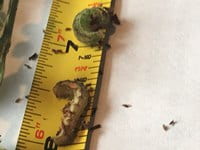–by Dr. Jeff Whitworth
Most soybeans around north central Kansas are now well into the mid to late reproductive stages. There doesn’t seem to be much potential for any massive infestations by defoliators and even if there was, as the soybeans get farther along in their development the leaf tissue becomes less needed. However, the direct pests, those that feed on the marketable product, are still very active and some are even increasing. Bean leaf beetle adults are active, feeding on pods, however, there do not seem to be as many as in past years. Soybean podworms, i.e., corn earworms/sorghum headworms, are very common and seem to be increasing in numbers in some areas. Treatment thresholds are usually considered to be 1 larva/row foot, with small worms, i.e., less than ½ inch (see pic1) and they are feeding on the seeds (beans). These larvae feed for roughly 2 weeks before pupating. As the larvae develop larger than the one shown here (see pic 1) they consume more as they get bigger and this feeding will continue for about another 7-10 days at these temperatures
